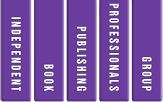There has never been a better time to be an indie book author.
The number of books published "non-traditionally" has increased exponentially in recent times. Whether you're a non-fiction writer burning to share your expertise on a particular subject, or a novelist keen to beguile readers with your imaginative creations, you have a larger range of options available to you today than ever before. The Next Generation Indie Book Awards celebrates this diversity and vitality by recognising and rewarding the best.
Publishing is changing at a bewildering pace, with new technologies and new players coming into the market and shaking up the book world from top to bottom. For those who find it all a little confusing, here's a brief overview.

Publishing is changing at a bewildering pace, with new technologies and new players coming into the market and shaking up the book world from top to bottom. For those who find it all a little confusing, here's a brief overview.
Publishing Independently
The larger publishing conglomerates — the Big Six, as they're often called — may find it hard to take a risk on an unknown author or a work without obvious blockbuster potential, especially in these tough economic times. This is where small and medium-sized independent publishing companies come in, as they're often willing to sign authors who might not fit the mold in mainstream publishing. Many indie publishers specialise in particular areas such as genre fiction, poetry, niche non-fiction or academic publishing. They can prepare your work to be read and enjoyed — that is, take on the editing, book design, printing, etc. — and, crucially, get your book to the right readership and make sure they know about it.
Printing on Demand (POD)
Printing a quality product used to be an expensive business necessitating large print runs. All that changed with the advent of digital printing and the development of Print on Demand technology. Suddenly it was possible to produce high quality books at much lower cost, and it's now become economically viable to print off single copies of a title when an order is actually received. This is the ideal system for many smaller publishers — university presses, for example — and many indies have converted from traditional printing systems to POD.
Reading Electronically

If you've travelled on public transport over the last decade, you'll have noticed the dramatic increase in the number of commuters with their noses buried in tablet reading devices — Kindles, iPads, Sony Readers, Kobo eReaders and the like — instead of paper-based books and newspapers. There's more to electronic publishing than e-readers, however: for quite some time now, people have been able to access books on websites or as PDFs on personal computers.
Electronic booksellers such as Amazon, with its Kindle bookstore, and Apple, with its iBooks store, have been luring book buyers into the online environment in ever larger numbers. With the arrival of tablet reading devices, gone is that terrible fear experienced by many booklovers that they could be left without anything to read after the stores are closed. Kindles and iPads have a marvellous inbuilt home delivery network that pings a new book into your device in an instant. No surprise then that e-books are a huge growth area for independent publishers.
The mainstream publishers are also cashing in on the power of online, producing e-versions of their traditionally published books enriched with video, author interviews and other extras. For some bestselling authors, the e-book version of their work accounts for as much as 50% of their overall sales.
Publishing yourself
Some authors choose to publish their work themselves. This means they are responsible for the entire process including book design, formats, price, distribution, marketing & PR. There are many companies offering services to self-publishers who can assist with all or part of this process.
Authors today can make use of the Internet's unique distribution and marketing mechanisms — the search engine; bloggers and website curators who may review your book; the e-bookstore and its suggestion algorithms (recommendations of the "people who bought this also bought..." variety). If a self-published writer is very, very lucky, his or her work may get puffed by a popular blogger or lauded by a high-ranked tweeter. If the book "goes viral" it may even be picked up by a mainstream publisher.
Winning over the readers
There's no guarantee this will happen, however, no matter how good the book is, which is why the Next Generation Indie Book Awards are so important. Firstly, winners in a wide range of categories receive the validation and recognition they deserve from the experts on the judging panel. Secondly, by celebrating and publicising the independent publishing sector, the Awards help put indie books into the hands of a greater number of readers, which is a big win for everyone, authors and booklovers alike.
Winning over the readers
There's no guarantee this will happen, however, no matter how good the book is, which is why the Next Generation Indie Book Awards are so important. Firstly, winners in a wide range of categories receive the validation and recognition they deserve from the experts on the judging panel. Secondly, by celebrating and publicising the independent publishing sector, the Awards help put indie books into the hands of a greater number of readers, which is a big win for everyone, authors and booklovers alike.

